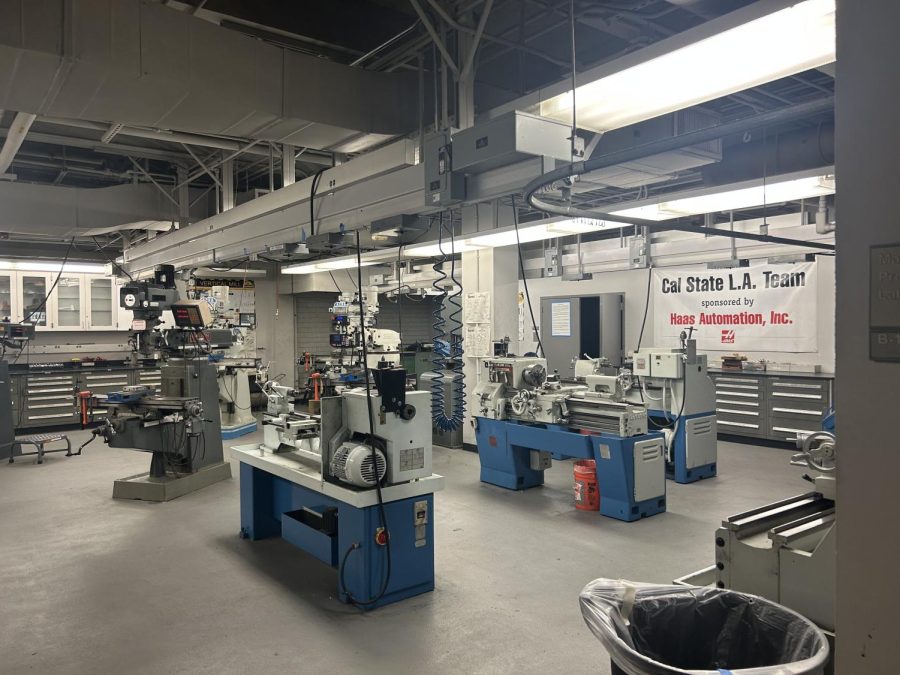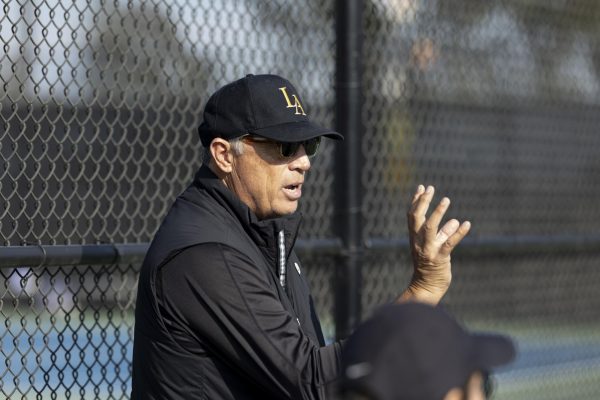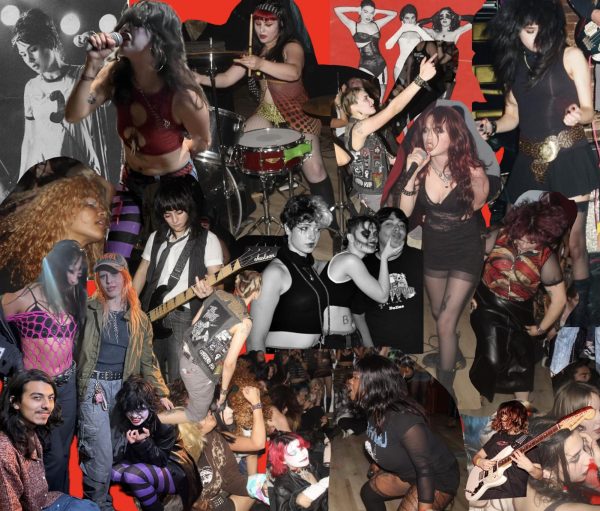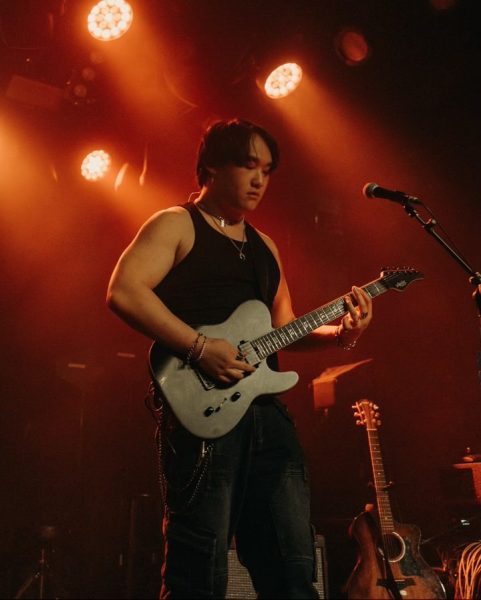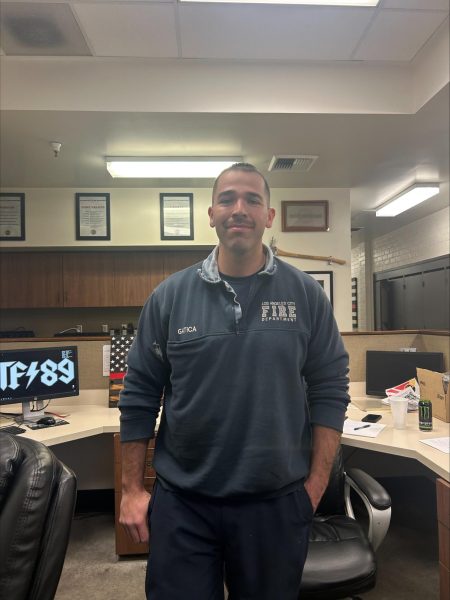An engineer’s refuge: The Makerspace
The Makerspace on the first floor of the engineering building. Photo by Brian Lai.
Where do the Golden Eagle Makers and Repair Cafe reside?
The Makerspace is located on the first floor of the engineering building, room B-11, next to Parking Lot 9. Open from 8 a.m. to 6:30 p.m., the Makerspace hosts plenty of workshops.
It’s a spot where students can come to learn engineering skills and work on their projects.
“So the Makerspace is all about giving the tools and skills needed for the STEM field, at least for engineers,” said Gian Owen, a third year mechanical engineering major. “Civil engineers, mechanical engineers, even electrical engineers come here to explore their skills.”
The staff who work in the Makerspace are hand-selected by faculty members to advise and assist budding engineers with their projects. Through specialized training workshops, students are taught how to use tools like circular saws, mills, and blades in the Makerspace. Among other things, students are also encouraged to explore new concepts and to construct whatever they can envision.
“We do a lot of training to use equipment, we have anything from teaching people how to use 3D printers, to laser patterns, to soldering,” said Chris Bachman, associate professor in mechanical engineering. “We do mills and lathes for metal working, welding for joining metals together. We do computer controlled machining, like programming a robot to do machining. A range of those workshops, and then we have a Repair Cafe. We have a lot of clubs that operate out of here.”
At the hallway near the entrance, schedules are posted for workshops within the Makerspace.
“Students should go ahead and sign up through the computer because that’s how the Makerspace generally gets their money,” Owen said. “That shows that students are coming in here and being able to use these tools, this equipment, going to these workshops, and generally being interested in the Makerspace itself.”
Within the Makerspace, students can rest easy with the knowledge that they‘re in the hands of tutors and more experienced peers who don’t mind lending a hand to the next generation of engineers.
“All of these clubs in this space, they’re meant to be very accessible to students with no experience, give you an opportunity to learn and teach others,” Bachman said.
The Repair Cafe
The Repair Cafe, run by Josef A. Velten, a part-time lecturer, works within the Makerspace area. It runs from Wednesday 12- 4 p.m. every week, consisting of two to three people who assist Velten.
The Repair Cafe works on a multitude of electronics that students have given to them to repair for free like laptops, phones and even electronic skateboards.
“We’ve also worked on analog radios, video cards, smartwatches, and probably some other things I can’t recall off the top of my head,” Velten said. The Repair Cafe has fixed around “10-15 laptops, a half dozen cell phones, several video cards, maybe five or six electric skateboards, a couple pairs of headphones, and more.”
The length of repairs depends on diagnosing what students turn in and the act of repair itself. For some repairs jobs it can take only minutes to fix, like faulty charging ports in laptops or malfunctioning computer mouses, according to Velten. Others may only need some cleaning, “There’s a lot of people out there who don’t do routine cleaning of their electronics, I’ve learned,” Velten said.
But for some repairs, it can take upwards to several hours or weeks.
“Repairs can be broken down into two parts: diagnostics and the act of repair,” Velten said. “By and large, once we know what needs to be fixed, repairs themselves take no more than 30 minutes as a general rule.”
Velten maintains that the process of diagnosing the issues for devices could be more complicated than the act of repair itself, since any number problems can compound and make the repair itself be done through consecutive steps.
Occasionally, there are things that even the Repair Cafe can’t fix, like burnt out chips or fried motherboards. If that happens, then sometimes it’s suggested to the student that it’s best to throw things out rather than fix something unsalvageable.
Velten maintains that the repairs that the Repair Cafe undertakes are free, in line with the philosophy of sustainability.
“Compensation doesn’t need to be in dollars and cents,” Velten said. “Students don’t have to buy new stuff, and I’m happy to help with that too.”
Velten remembered when he was a college student too, so the only thing that Velten gets out of the repairs is the joy of helping students out. As for the other members of the Repair Cafe, it’s a sense of satisfaction and the knowledge gained from fixing things.
The Golden Eagle Makers
Bachman runs the Golden Eagle Makers, a club of engineering students who are involved in community projects all over L.A. Consisting of around 10-20 current members, the club is open to anyone who wishes to join.
“The Golden Eagle Makers, we’re generally a new club here,” said Owen. “We just started this spring semester but the old golden eagle makers actually started around 2019-2020.”
The Golden Eagle Makers are a revamped version of the old club, with Chris Bachman acting as their faculty advisor, as well as the head of the Makerspace equipment.
Students can just sign up and then start by working with someone else who knows more about how to design and build and get taught along the way, according to Bachman. After some hands-on experience, you can start taking projects on by yourself.
“We’ve worked with a local preschool to take down some of their shade canopy that was out of shape and to replace it with a nicer shade canopy,” Bachman said. “We’ve also worked with a hazmat unit out of the sheriff’s department to fix some of their testing equipment, so that involved building sampling holders.”
According to Bachman, the Golden Eagle Makers Club does projects for the community for local community partners like LA Animal Services, where they build things: enclosures for dogs, things they can use to retrieve dogs from their kennels, and storage space.
“The Golden Eagle Makers, we’re a community based organization,” Owen noted. “So we’re out there trying to help out our community and to make a positive impact as best as we can. It’s not just engineering, it’s being able to explore different skills from different majors, through communication, you can build something better.”
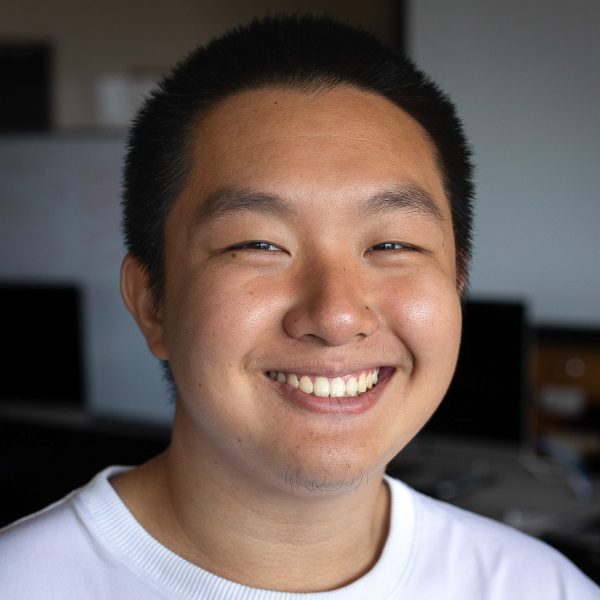
Brian Lai is an English major, and an UT reporter that writes mostly about Calstate LA’s campus. He covers campus events, issues and highlights, and...

